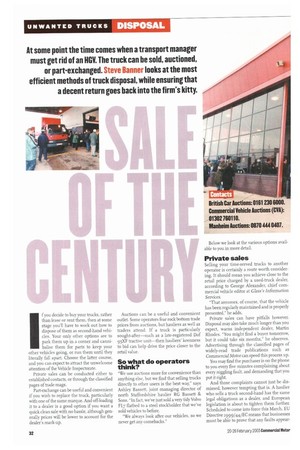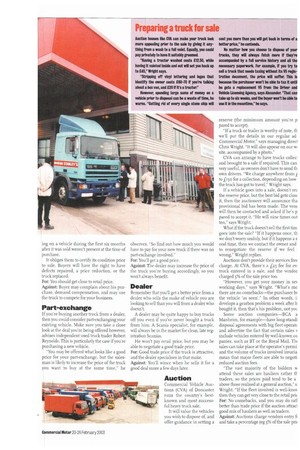1 I you decide to buy your trucks, rather
Page 32

Page 33

If you've noticed an error in this article please click here to report it so we can fix it.
than lease or rent them, then at some stage you'll have to work out how to dispose of them as second-hand vehicles. Your only other options are to park them up in a corner and cannibalise them for parts to keep your other vehicles going, or run them until they literally fall apart. Choose the latter course, and you can expect to attract the unwelcome attention of the Vehicle Inspectorate. Private sales can be conducted either to established contacts, or through the classified pages of trade mags. Part-exchange can be useful and convenient if you wish to replace the truck, particularly with one of the same marque. And off-loading it to a dealer is a good option if you want a quick clean sale with no hassle, although generally prices will be lower to account for the dealer's mark-up.
Auctions can be a useful and convenient outlet. Some operators fear rock bottom trade prices from auctions, but hauliers as well as traders attend. If a truck is particularly sought-after—such as a late-registered Daf 95XF tractive unit—then hauliers' keenness to bid can help drive the price closer to the retail value.
So what do operators think?
-We use auctions more for convenience than anything else, but we find that selling trucks directly to other users is the best way," says Ashley Bassett, joint managing director of north Staffordshire haulier RG Bassett & Sons. In fact, we've just sold a very tidy Volvo F1.7 flatbed to a steel stockholder that we've sold vehicles to before.
"We always look after our vehicles, so we never get any comebacks." Below we look at the various options available to you in more detail.
Private sales
Selling your time-served trucks to another operator is certainly a route worth consider. ing. It should mean you achieve close to the retail price charged by a used-truck dealer, according to George Alexander. chief commercial vehicle editor at Glass's Information Services.
"That assumes, of course, that the vehicle has been regularly maintained and is properly presented," he adds.
Private sales can have pitfalls however. Disposal may also take much longer than you expect, warns independent dealer, Martin Rhodes. "You might find a buyer tomorrow, but it could take six months," he observes. Advertising through the classified pages of widely-read trade publications such as Commercial Motor can speed this process up.
You may find the purchaser is on the phone to you every five minutes complaining about every niggling fault, and demanding that you put it right.
And those complaints cannot just be dismissed, however tempting that is, A haulier who sells a truck second-hand has the same legal obligations as a dealer, and European legislation is about to tighten them further. Scheduled to come into force this March, EU Directive 1999/44/EC means that businesses must be able to prove that any faults appear
ing on a vehicle during the first six months after it was sold weren't present at the time of purchase.
It obliges them to certify its condition prior to sale. Buyers will have the right to have defects repaired, a price reduction, or the truck replaced.
For: You should get close to retail price. Against: Buyer may complain about his purchase, demand compensation, and may use the truck to compete for your business.
Part-exchange
If you're buying another truck from a dealer, then you could consider part-exchanging your existing vehicle. Make sure you take a close look at the deal you're being offered however, advises independent used truck trader Robert Reynolds. This is particularly the case if you're purchasing a new vehicle.
"You may be offered what looks like a good price for your part-exchange, but the salesman is likely to increase the price of the truck you want to buy at the same time," he observes. "So find out how much you would have to pay for your new truck if there was no part-exchange involved."
For: You'll get a good price.
Against: The dealer may increase the price of the truck you're buying accordingly, so you won't always benefit.
Dealer
Remember that you'll get a better price from a dealer who sells the make of vehicle you are looking to sell than you will from a dealer who doesn't.
A dealer may be quite happy to buy trucks off you even if you've never bought a truck from him. A Scania specialist, for example, will always be in the market For clean, late registration Scanias.
He won't pay retail price, but you may be able to negotiate a good trade price.
For. Good trade price if the truck is attractive, and the dealer specialises in that make. Against: You'll wince when he sells it for a good deal more a few days later.
Auction
Commercial Vehicle Auctions (CVA) of Doncaster runs the country's bestknown and most successful heavy truck sale.
It will value the vehicles you wish to dispose of, and offer guidance in setting a
reserve (the minimum amount you're p pared to accept).
"If a truck or trailer is worthy of note, th we'll put the details in our regular ad Commercial Motor," says managing direct Chris Wright. "It will also appear on our w: site, accompanied by a photo."
CVA can arrange to have trucks coiledi and brought to a sale if required. This can very useful, as owners don't have to send th own drivers. "We charge anywhere from to Li5o for a collection, depending on how the truck has got to travel," Wright says.
If a vehicle goes into a sale, doesn't re the reserve price, but the best bid gets doss it, then the auctioneer will announce tha provisional bid has been made. The veric will then be contacted and asked if he's p pared to accept it. He will nine times out ten." says Wright.
What if the truck doesn't sell the first tim goes into the sale? "If it happens once, tit we don't worry unduly, but if it happens a s ond time, then we contact the owner and to renegotiate the reserve if we feel wrong," Wright replies.
Auctions don't provide their services free charge. At CVA, there's a Las fee for evi truck entered in a sale, and the vendor charged 5% of the sale price too.
"However, you get your money in so, working days," says Wright. "What's me there are no comebacks—the purchaser bi the vehicle 'as seen'." In other words, develops a gearbox problem a week after h bought it, then that's his problem, not you Some auction companies—RCA a Manheim, for example—have long-standi disposal agreements with big fleet operatc and advertise the fact that certain sales io include vehicles entered by well-known co panies, such as BT or the Royal Mail. Thi sales can take place at the operator's premi: and the volume of trucks involved invaria mean that major fleets are able to negoti reduced auction fees.
"The vast majority of the bidders A attend these sales are hauliers rather if traders, so the prices paid tend to be a above those realised at a general auction," s: Wright. "If the fleet involved is well-lcnoli then they can get very close to the retail pric For: No comebacks, and you may do ratl better than trade price if the auction attrad good mix of hauliers as well as traders. Against: Auctions charge vendors entry fi and take a percentage (eg 5% of the sale prit




























































































































































